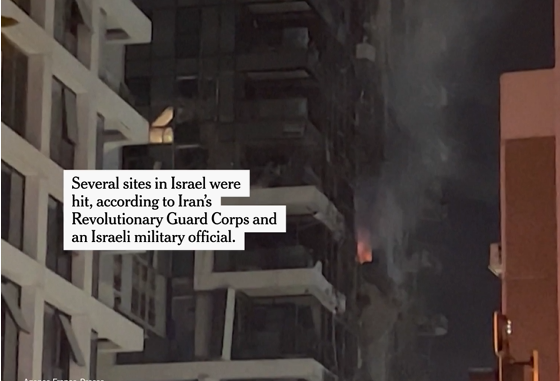Israel has struck Iran’s nuclear sites and military leaders, and Tehran has retaliated with missiles. More than 70 people have been killed in Iran, and at least three in Israel.
Israel pressed on Saturday with its campaign against Iran’s nuclear sites and military leaders. Iran in turn has launched barrages of ballistic missiles and drones, with neither side showing any inclination to end the fighting despite international calls for de-escalation.
The sweeping attacks by Israel, which began early Friday, have killed more than 70 people, including four of Iran’s top security chiefs, and damaged Iran’s main nuclear site at Natanz. Iran retaliated by launching scores of missiles at Israel. At least three people have been killed and dozens more wounded during these attacks.
The most intense fighting in decades between the two heavily armed countries has stirred international anxiety over the prospect of an increasingly deadly conflict that could draw in the United States and other major powers.
The Israeli attack came as the United States and Iran were negotiating terms for a new diplomatic agreement to curb Iran’s nuclear program. Israel has argued that Iran — its main regional opponent — had been making progress toward building a nuclear weapon, which Israel regards as an existential threat.
Residents of Tehran, Iran’s capital, reported hearing explosions on Saturday morning, and Iranian air defenses were activated. Precise casualty figures in Iran could not be confirmed, but Iran’s U.N. ambassador, Amir Saeid Iravani, told the Security Council that Israel’s strikes had killed 78 people and injured more than 300 others.
Across Israel, people huddled in reinforced bomb shelters as air-raid sirens wailed outside, warning of incoming missile fire. Loud explosions reverberated overhead as Israel’s sophisticated antimissile defenses sought to intercept the missiles.
On Saturday morning, at least two people were dead and around 19 injured in central Israel in the wake of an Iranian missile attack, according to Israeli health workers. Magen David Adom, the country’s emergency service, published footage from the scene showing heavily damaged homes that appeared to have been bombed. Another person had been killed earlier during an Iranian missile barrage in Ramat Gan, a suburb east of Tel Aviv, the police said.
Iran’s supreme leader, Ayatollah Ali Khamenei, said earlier that Iran was punishing Israel for the assault. The Islamic Revolutionary Guards Corps, a powerful Iranian state security body, said the targets were Israeli military sites used to attack Iran.
Prime Minister Benjamin Netanyahu of Israel has vowed that the campaign will last for “as many days as it takes” and told the Israeli public to prepare for a difficult struggle. In a video statement on Friday night, he argued that Iran had “never been weaker.”
The United States’ possible role in the spiraling conflict remained unclear. While Israeli officials had hoped the Trump administration would participate in a joint attack, Secretary of State Marco Rubio denied U.S. involvement in the strikes. But President Trump also did not call for Israel to rein in its assault.
Here’s what else to know:
- Top Iranians killed: Two high-ranking military commanders, Mohammad Bagheri and Gen. Hossein Salami, were killed, Iran said, as was Ali Shamkhani, who had been overseeing the nuclear talks with the United States, officials said. Read more ›
- Nuclear sites: Rafael Grossi, the head of the United Nations’ nuclear watchdog, told the Security Council that Israel’s strike had destroyed the aboveground enrichment plant in Natanz, causing some chemical and radiological contamination. But he said the leak was “manageable.” He said the Iranian authorities had reported strikes on nuclear facilities in Fordo and Isfahan as well. Read more ›
- Trump’s reaction: Mr. Trump is navigating the divides within the Republican Party over whether the United States should get involved in another foreign conflict. His administration had been holding nuclear talks with Iranian officials, and he has urged Tehran to strike a deal to curb its nuclear program or risk “even more brutal” attacks. Iran said it would not attend talks scheduled for this weekend in Oman.



